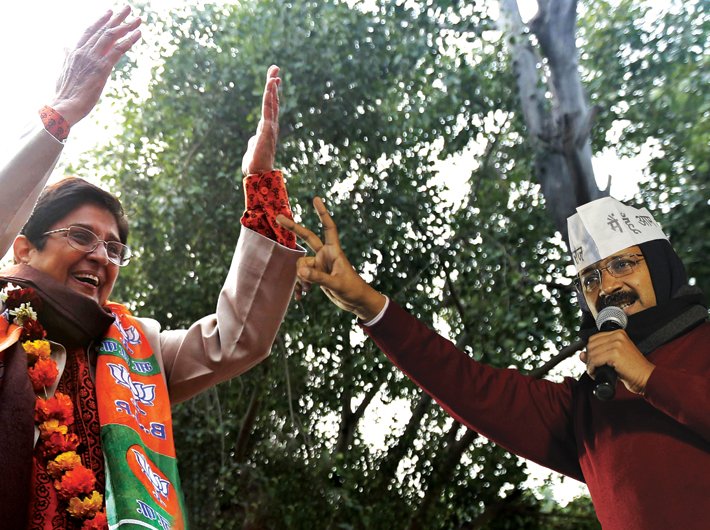Kejriwal is setting the agenda, Bedi is backed by strong cadre; but the capital’s own leaders are either absent or elsewhere
In his novel “Delhi”, Khushwant Singh described his mistress Bhagmati as akin to the capital: both are unattractive and detestable, yet their roughness on surface conceals a seductive charm underneath. It is difficult to keep away from both for long. The mystery of Delhi never ceases to surprise even the most illustrious sons and daughters of the city.
Only 13 months back the rise of the Aam Aadmi Party (AAP) to power bewildered the nation. AAP’s supremo Arvind Kejriwal was still wet behind his ears in political terms when he was called to be sworn in as chief minister. It was a unique moment for many reasons. Kejriwal was neither a resident of Delhi nor a traditional politician. But people of Delhi were not parochial. They dumped stalwarts in favour of a novice.
Delhi’s roller-coaster ride came to an abrupt halt when after 49 days in power, Kejriwal walked out of the chief minister’s office as dramatically as he had entered it. There is nothing new in outsiders taking Delhi for a ride and plunder. History is replete with such instances. Ironically, even democracy could not change Delhi’s destiny. Nothing illustrates Delhi’s acute dilemma as sharply as the state assembly elections to be held on February 7.
Kejriwal still remains an enigma. His personal reputation of being incorruptible does not jell with his political inconsistencies and incoherence. Yet, he exudes a novelty which traditional leaders of Delhi lack. In fact, it would not be wrong to say that Kejriwal has been setting the agenda for Delhi polls. He borrowed tricks from the BJP’s armoury to beat them at their own game.
Look at the manner in which he turned elections as a referendum on personalities. In psy-war you invent an enemy if there is none. Kejriwal discovered a forgotten Jagdish Mukhi of the BJP as his rival for the chief minister’s post. Posters stuck on auto rickshaws of Delhi proclaimed, “Kejriwal or Jagdish Mukhi”. The BJP never declared Mukhi as its chief ministerial candidate. Kejriwal did it for the BJP to arrive at a favourable comparison. What Kejriwal resorted to was a white lie. But Kejriwal graduated too fast from his apprenticeship to a mature politician to imbibe an eternal value of chicanery – that everything is fair in politics.
This explains why he borrowed from an old slogan from the Hindutva lexicon. “Jo kaha so kiya (We did what we promised)” slogan was on hoardings all over Delhi in the run-up to the elections. In the post-Babri demolition phase, the same slogan was used by Kalyan Singh in the 1993 Uttar Pradesh assembly elections to proclaim Hindutva forces’ bravado. Perhaps, Kejriwal seems too much inspired by his intimate enemies and tries to emulate them to the hilt.
But imitation has its limitations. It makes you the second best. This is what the BJP proved when party president Amit Shah decided to project Kiran Bedi, a comrade in arms of Kejriwal during the famous Anna movement, as the party’s chief minister candidate. This was not an easy decision for a party which claims Delhi as its original citadel. Like Kejriwal, Bedi’s association with Delhi is not filial. And that proved to be her major qualification. No doubt, the BJP has pulled an ace over Kejriwal as the election draws near. Backed by a strong cadre network, the Bedi-led BJP would ultimately establish its strategic and electoral superiority.
But Delhi’s dilemma is far from over. Its inability to throw up a credible leadership for itself is an acute crisis of confidence though Delhi can boast of having the best of India. This is reflected in the manner in which even local heavyweights seek political legitimacy and heft by contesting elections from other states. This is why Arun Jaitley and Sushma Swaraj chose to fight Lok Sabha elections not from Delhi but from Punjab and Madhya Pradesh, respectively.
The courtier culture of the city has produced an elite which treats Delhi, in Khushwant Singh’s metaphor, as Bhagmati. Perhaps, Delhi needs to rekindle the spirit of one of its most admired Urdu poets, Mohammad Ibrahim Zauq, who said, “In dinon garche dakkan mai hai badi qadr-e-sukhan, kaun jaye Zauq par dilli ki galiyan chhod kar?” (These days, the Deccan is very prosperous, but Zauq who wants to leave the streets of Delhi?)
[email protected]



